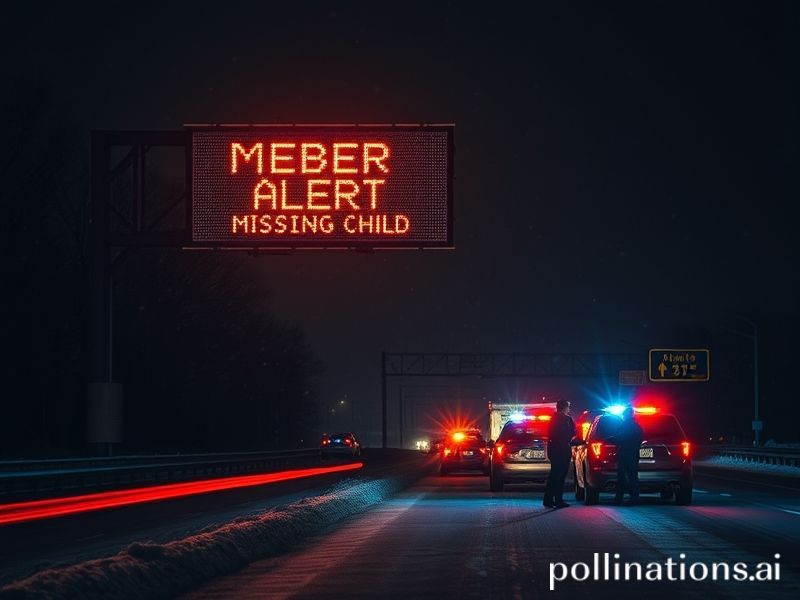Connecticut’s Amber Alert Goes Global: How One Missing Child Briefly Unites the Planet in Dread
Connecticut, the nutmeg-scented buckle of America’s Northeastern belt, issued another Amber Alert last week, a digital flare shot into the night sky that pinged phones from Mystic to Mumbai. In theory, the alert is a humble, localized SOS for a missing child. In practice, it ricochets through undersea cables and low-orbit satellites, reminding six billion non-Americans that somewhere a small human has been subtracted from the daily census—and the rest of us are invited to rubberneck in real time.
The system itself is a marvel of cooperative bureaucracy: U.S. cell carriers, the Justice Department, local police, and, somewhere in the chain, a sleep-deprived sergeant who still types with two fingers. Once triggered, the alert hijacks every screen within the geofence, turning commuters’ podcasts into a blaring klaxon. It is, arguably, the only U.S. export that arrives instantly, tariff-free, and with no carbon footprint—unless you count the spike in heart rates.
Internationally, the spectacle elicits reactions calibrated to each nation’s temperament. Canadians mutter about better amber maple syrup branding. Europeans draft a new GDPR addendum ensuring the child’s data is anonymized, even while the child is still missing. The Japanese politely marvel at how Americans voluntarily allow their phones to scream at them. Meanwhile, conspiracy Telegram channels in fourteen languages conclude the child is actually a crisis actor hired by the same shadowy cabal that faked the moon landing and ran out of original ideas.
Yet the raw fact remains: a child vanished. That is the universal gut punch, the one headline that transcends borders like bad pop music. From Lagos to Lisbon, parents reflexively inventory their own offspring, quietly grateful it isn’t their turn in the spotlight. In that sense, the Connecticut alert is a macabre global mirror: we all fear the same darkness; we just accessorize it with local superstitions.
There is also the question of scale. Connecticut is roughly the size of Brunei, minus the oil sultan and plushed insurance executives. When an alert fires there, the rest of the planet briefly misplaces Brunei on the mental map, wondering if perhaps the missing child is why Brunei never seems to trend. This is the cruel arithmetic of attention: 3.6 million Connecticut residents versus eight billion curious bystanders, each refreshing Twitter like a slot machine of other people’s nightmares.
Technologically, the Amber Alert is a cousin to South Korea’s emergency earthquake texts and the Netherlands’ flood warnings—governmental pop-ups that remind citizens the state can still find them, even if it can’t always protect them. The difference is that earthquakes and floods are indifferent; abductors are human, which means the drama comes with plot twists. Will the suspect be found at a rest stop eating a sad hot dog? Will the child be recovered safely in time for the nightly news to pivot to inflation? Or will we upgrade to a statewide manhunt, the kind that lets cable anchors practice their solemn faces?
The darker truth, the one nobody appends to the push notification, is that most missing children are taken by estranged parents, not lurking strangers. Statistically, the alert is less a race against a predator than a domestic custody dispute gone mobile. But “Dad forgot visitation hours” doesn’t trend on TikTok, whereas “armed and dangerous” racks up the retweets. Humanity, ever the dramatist, prefers villains with trench coats over the banality of marital spite.
Ultimately, the Connecticut alert is a small, tragic opera performed on an enormous stage. It lasts anywhere from minutes to days, then dissolves into the next outrage. Somewhere, a family either reunites or shatters; elsewhere, the planet scrolls on. The system works just often enough to justify its existence and just rarely enough to remind us how fragile our wiring really is. And when the next alert lights up your phone—whether you’re in Hartford or Hanoi—you’ll look, because that’s what we do: we witness, we worry, and we pretend the distance makes us safe.







